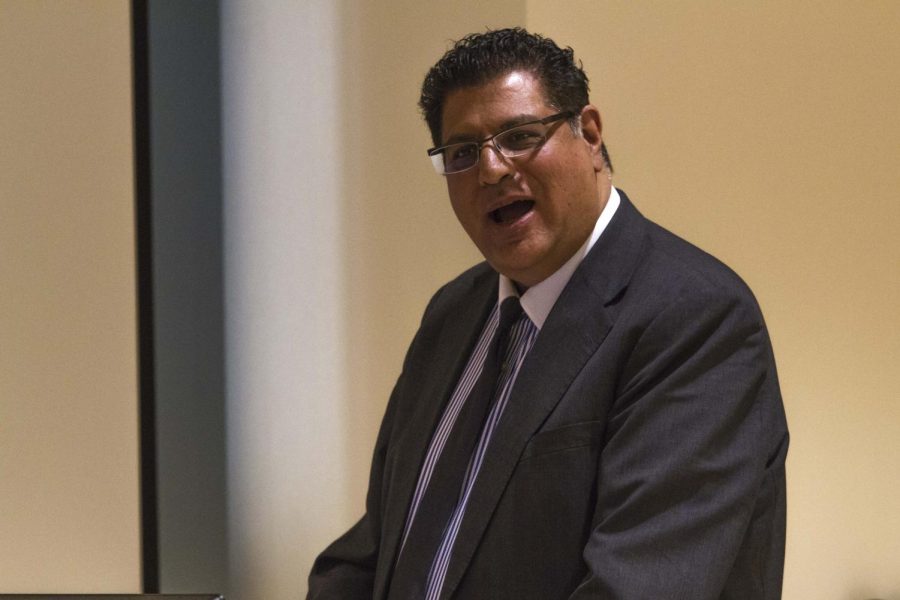Deputy senior district judge of England and Wales talks about law, justice and diversity at COD
District Judge Tan Ikram spoke to a packed crowd in the Health Science Center about the potential impact a political change like Brexit could have on the United Kingdom’s legal system
May 1, 2018
Immigration took center stage in the United Kingdom’s political discourse when citizens voted to the leave the European Union in 2016.
At a global education event hosted by College of DuPage on April 27, United Kingdom District Judge Tan Ikram spoke to a packed crowd in the Health Science Center about the potential impact a political change like Brexit could have on the United Kingdom’s legal system. Ikram spoke on the topic: “Law, Justice and Diversity in the United Kingdom.”
Ikram was called to the Bar in 1990 and admitted as a solicitor in 1993. He specialized in criminal defense and prosecution work. He was later appointed as a part-time deputy district judge in 2003 and a full-time district judge in 2009, as a specialist in extradition and terrorism.
“The consequences are profound,” Ikram said about the 2016 Brexit vote. “It is like California saying, ‘We want to leave the United States.’ If that could happen, how do you distance yourself when much of your laws are federal laws? Overnight, that won’t apply because you won’t be a member of the United States. When laws disappear, there is going to be a vacuum.”
According to Ikram, laws that were enacted at the level of the European Union or the current European Union licensing system could be affected.
“Within two years, we have to recreate a whole layer of bureaucracy that we don’t have,” Ikram said.
On the issue of justice, ethnic and racial disparity in prisons across the United Kingdom appears to be a problem. Ikram, citing a report published by Labour MP David Lammy, said black people in the United Kingdom account for just 3 percent of the population, but they make up 12 percent of people in prison population. Twenty-five percent of the prison population comes from an ethnic minority population.
“Why is it that a country which prides itself on diversity, equality and justice has so many people of color languishing in prisons?” Asked Ikram.
The Lammy Review concluded that black and minorities face ethnic bias. This could be a result of “overt discrimination” or “implicit bias.”
According to Ikram, there has been a decline in the practice of “overt discrimination,” or people going out of their way to treat people differently because of their color. But, the issue of “implicit bias” is becoming more appalling.
Why did Ikram, given his position as a judge, talk about problems within the United Kingdom’s criminal justice system?
“The treatment of people from a different background is a real issue,” Ikram said. “If you believe in justice, then these things really matter. Lawyers who become judges must believe in justice.”
But, whites are more likely to be found guilty in criminal courts by juries, while people of Asian descent are the least likely to be found guilty.
“Is there a racism far more subtle that we can’t understand?” Asked Ikram.
According to Ikram, these statistics aren’t the only factors that suggest how just or unjust a society is.
“Justice isn’t just about how you’re treated by the police or judge; justice is about whether you have an access to the system,” Ikram said.
The government of the United Kingdom assists citizens with the costs of legal advice, family mediation and representation in a court or tribunal.
The complex outlook of the United Kingdom’s justice system led Ikram into his discussion about diversity.
About 6 percent of the people serving in the United Kingdom’s police force comes from black and other ethnic minority backgrounds. Blacks and other ethnic minorities make up about 4 percent of the judges within the judiciary.
“We don’t reflect the face of the society that we serve,” added Ikram. “Those people who are exercising power over us are not us.”




















